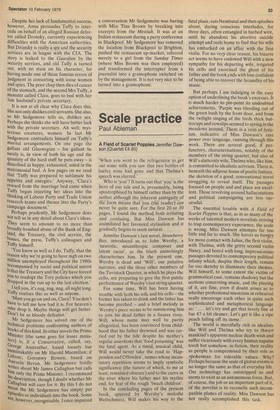Scale practice
Paul Ableman
A Field of Scarlet Poppies Jennifer Dawson (Quartet E4.95) 'When you went to the refrigerator to get out some milk you saw that two bottles of barley wine had gone and that Thelma's speech was slurred.'
Who is 'you'? It turns out that 'you' is the hero of our tale and is, presumably, being apostrophised by himself rather than by the author although the inherent ambiguity of the form Means that You (the' reader). Can never be quite sure. For the first 20 or 30 pages, I found the method both irritating and confusing. But Miss Dawson has assimilated her favoured stylisation and it gradually begins to seem natural.
Jennifer Dawson's last novel, Strawberry Boy, introduced us to John Wersby, a 'neurotic, misanthropic composer and latent racist', as the blurb uninvitingly characterises him. In the present one, Wersby is dead and 'Will', our putative narrator, and the three other members of the Tavistock Quartet, in which he plays the cello, are preparing to give the first public performance of Wersby's last string quartet. For some time, Will has been having trouble with both his wife and his cello — the former has taken to drink and the latter has become parched — and a brief melody in Wersby's piece seems to be summoning him to join his dead father in a Sussex river. Will, whose name may well be partly allegorical, has been convinced from childhood that his father drowned and was carried out by the tide despite his mother's regular assertions that 'food poisoning' was the fatal agent. As a timid, musical child, Will would never take the road to 'Happenden and Offenden', names whose incantatory repetition seems to imply symbolic significance (the nature of which, to me at least, remained obscure) and to the curve in the river where his father met his mythic end, for fear of the rough 'beach children'.
In the concluding pages of the present book, spurred by Wersby's melodic Weltschmerz, Will makes his way to the fatal place, eats Nembutal and then splashes about, during conscious interludes, for three days, often entangled in barbed wire, until he abandons his abortive suicide attempt and reels home to find that his wife has embarked on an affair with the first violin. For no very clear reason, his bizarre act seems to have endowed Will with a new sympathy for his departing wife, irrigated his cello and exorcised the ghost of his father and the book ends with him confident of being able to recover the fecundity of his music.
But perhaps I am indulging in the easy option of underlining the book's excesses. It is much harder to pin-point its undoubted achievements. 'Purple was bleeding out of the green bush by the front door, and from the twilight singing of the birds thick buttercups and cowslips seemed to spring in the meadows around. There is a vein of lyricism, indicative of Miss Dawson's rare power over language, running through this work. There are several good, if perfunctory, characterisations, notably of the members of the string quartet, but also of Will's slatternly wife, Thelma who, like him, is committed to idealistic activism. There is, beneath the adipose tissue of poetic fantasy, the skeleton of a good, conventional novel struggling to reveal itself. The passages focused on people and and place are excellent. Those revolving around hallucinations and political campaigning are less successful.
The essential trouble with A Field of Scarlet Poppies is that, as in so many of the works of talented modern novelists striving to trap contemporary experience, the scale is wrong. Miss Dawson attempts far too little and far to much. She leaves us hungty for more contact with Julius, the first violin, with Thelma, with the gritty second violin Nancy, and bored with long, impressionistic passages devoted to contemporary political infamy which, despite their length, remain far too sketchy to illuminate their themes. Will himself, to some extent the victim of grammatical case, remains shadowy but the sections concerning music, and the playing of it, are fine, even if doubt arises as to whether professional musicians in rehearsal really encourage each other in quite such sophisticated and metaphorical language as: . .. let's try and get that lovely line at bar 47 a bit cleaner. Let's get it like a ripe peach falling off its stone.'
The world is mercifully rich in idealists like Will and Thelma who try to thwart mankind's apparent nuclear death-wish and suffer vicariously with every human napalm torch but somehow, in fiction, their reality as people is compromised by their role as spokesman for tolerable values. Why? Perhaps because the scale of global events is no longer the same as that of everyday life. Our technology has outstripped us and seems to exist as an autonomous force. But, of course, the job or an important part of it, • of the novelist is to reconcile such incompatible planes of reality. Miss Dawson has not really accomplished this task.


































 Previous page
Previous page